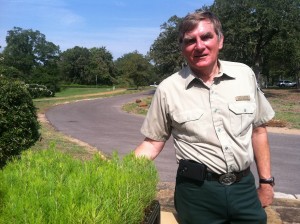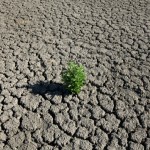Please Welcome the Lost Pines Back to Bastrop

Photo by Mose Buchele/StateImpact Texas
Loblolly pine seedlings take root in the shadow of destroyed trees in Bastrop.
During the Labor Day Wildfires of 2011, tens of thousands of acres burned in Central Texas, destroying over 1,600 homes and killing 1.5 million trees. Some of those trees were true Texas treasures: the Lost Pines of Bastrop State Park, a unique forest nearly a hundred miles apart from the Piney Woods of East Texas. Ninety five percent of the forest was turned to ashes during the fire.
And now they’re on their way back.
This week, nearly a half a million loblolly seedlings will make their way back to the soil of Bastrop State Park, with plans to plant 1.5 million next year and another million in the year following.
But those loblolly pine seedlings, which are now beginning to rebuild the Lost Pines, were close to almost being lost themselves.
As we reported in September, the seeds for the trees were almost thrown away before the fires because there wasn’t any demand for them. “We had had them, since 1992 in a freezer, you know and we thought ‘OK, are we ever going to use them? Maybe not,’” Texas A&M Forest Service Director Tom Boggus explained to StateImpact Texas. “Thank God we didn’t [throw them out].” They were three weeks away from being disposed of when the wildfires struck.
After the fires, a group of nurseries and agencies in Texas, Louisiana and Oklahoma grew the seeds into seedlings for replanting. Half of the trees coming in this week were grown by the Louisiana Department of Agriculture and Forestry, for instance.
The loblolly is a drought-hardy tree, but was no match for the Labor Day wildfires. The Texas Forest service says there’s still more seed left, enough to produce some 14 million more trees, which they say will be plenty to finish the project. But it’s going to take time, up to 25 years, before the Lost Pines return to their former glory.
“The function we have in restoration is to put the right genes back out there and then let Mother Nature sift through it. That’s the most anybody can do,” Tom Byram, a geneticist with the Texas A&M Forest Service’s tree improvement program, says in a statement today. “That’s our contribution. Mother Nature has to take the next step.”
If you’d like to volunteer to help out with planting the trees , there’s a few opportunities coming up. There’ll be a workday Saturday Dec. 1 and others to come. You can learn more at the Arbor Day website.

